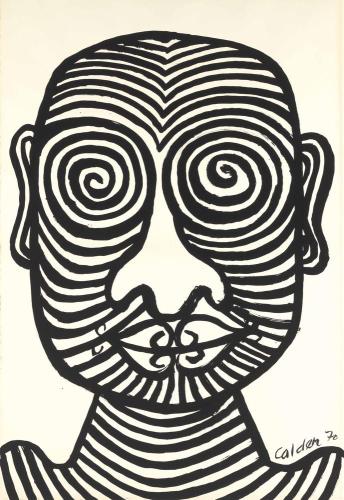An Imaginary Catastrophe
by Peter Dreyer (September 2022)

The Tattooed Man, Alexander Calder, 1970
The razor is a good servant but a bad master. —Koutsovlach saying
They showed up (inevitably) “out of nowhere,”
with the Even Worse Pissants (EWP) on their tails;
mercifully, the Garden State Parkway stopped the latter,
those who did not perish in Pennsylvania,
hoist on their own petards—and no pets de nonne those either![1]
But those dad-blasted Skordofálakroi were said to be extinct, too,
and all of a sudden, there they were, shave-pates à go-go with ugly tattoos,
checking phones, ride-sharing, texting, tweeting, rapping,
reeking of Versace, Mitsouko, and, for the nonce,
Jimmy Choo.
How on earth did they get past the serried ranks
of security, penetrate the razor wire, survive
the dark and frozen forests, and cross the sea?
Are they so much tougher and smarter than we?
You see them all over now, strolling in malls,
driving ubers and taxis, delivering mail, writing
traffic tickets, eating tapas, tending bar, waiting
on tables, marching in demos, getting clubbed
by the police, selling fake antiques, curating sociopathic
art, drinking fine Bordeaux and star-anise tsipouro,[2]
penning syndicated columns for the Post and the NYT,
designing barbarian-themed covers for the New Yorker,
pontificating on Fox and MSNBC, podcasting,
churning out novels, memoirs, and indie movies,
with those tedious but, it seems, obligatory sex scenes,
winning Emmys, Grammys, Oscars, Pulitzers, Nobels …
O lente, lente currite noctis equi![3] Those people will be
the death of me!
[1] Pets de nonne = literally, “nun’s farts,” little frittered pastries more politely called beignets soufflès.
[2] A Greek distilled spirit resembling grappa or raki, 40–45% alcohol.
[3] *”Slowly, slowly, you horses of the night!” Ovid, Amores 1.13.40, quoted in the final scene of Christopher Marlow’s The Tragical History of the Life and Death of Doctor Faustus.
Note: Σκορδοφάλακρος = Pilgarlic; a bald head likened to a peeled head of garlic (1529), a bald-headed man; from Latin pilare, deprive of hair; “from 17th c. applied in a ludicrously contemptuous way: ‘poor creature’” (Oxford English Dictionary). The Skordofálakroi, or Pilgarlics, an Amascythian tribe who shaved their heads, invaded the Occident in the *nth century, apparently driven from the steppe by their neighbors, the Ghuzz. US-EU Joint Emperor Cletus IV Malákagenitos memorably called them “an insatiably greedy lot of barbarians who for good money can be got to take almost any kind of job.”
Peter Richard Dreyer is a South African American writer. He is the author of A Beast in View (London: André Deutsch), The Future of Treason (New York: Ballantine), A Gardener Touched with Genius: The Life of Luther Burbank (New York: Coward, McCann & Geoghegan; rev. ed., Berkeley: University of California Press; new, expanded ed., Santa Rosa, CA: Luther Burbank Home & Gardens), Martyrs and Fanatics: South Africa and Human Destiny (New York: Simon & Schuster; London: Secker & Warburg), and most recently the novel Isacq (Charlottesville, VA: Hardware River Press, 2017).
Follow NER on Twitter @NERIconoclast







